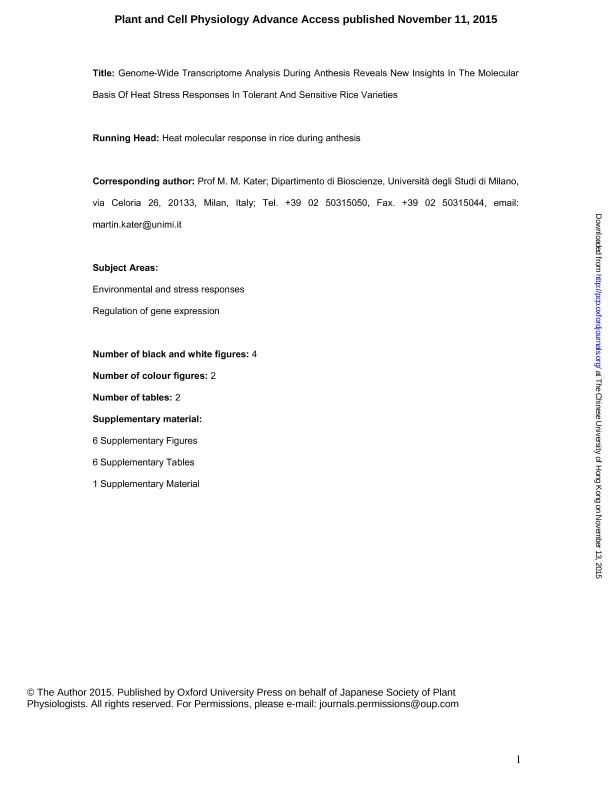Mostrar el registro sencillo del ítem
dc.contributor.author
Gonzalez Schain, Nahuel Damian

dc.contributor.author
Dreni, Ludovico
dc.contributor.author
Lawas, Lovely M. F.
dc.contributor.author
Galbiati, Massimo
dc.contributor.author
Colombo, Lucia
dc.contributor.author
Heuer, Sigrid
dc.contributor.author
Jagadish, Krishna S. V.
dc.contributor.author
Kater, Martin M.
dc.date.available
2020-01-09T21:23:53Z
dc.date.issued
2016-01
dc.identifier.citation
Gonzalez Schain, Nahuel Damian; Dreni, Ludovico; Lawas, Lovely M. F.; Galbiati, Massimo; Colombo, Lucia; et al.; Genome-wide transcriptome analysis during anthesis reveals new insights into the molecular basis of heat stress responses in tolerant and sensitive rice varieties; Oxford University Press; Plant And Cell Physiology; 57; 1; 1-2016; 57-68
dc.identifier.issn
0032-0781
dc.identifier.uri
http://hdl.handle.net/11336/94272
dc.description.abstract
Rice is one of the main food crops in the world. In the near future, yield is expected to be under pressure due to unfavorable climatic conditions, such as increasing temperatures. Therefore, improving rice germplasm in order to guarantee rice production under harsh environmental conditions is of top priority. Although many physiological studies have contributed to understanding heat responses during anthesis, the most heat-sensitive stage, molecular data are still largely lacking. In this study, an RNA-sequencing approach of heat- and control-treated reproductive tissues during anthesis was carried out using N22, one of the most heat-tolerant rice cultivars known to date. This analysis revealed that expression of genes encoding a number of transcription factor families, together with signal transduction and metabolic pathway genes, is repressed. On the other hand, expression of genes encoding heat shock factors and heat shock proteins was highly activated. Many of these genes are predominantly expressed at late stages of anther development. Further physiological experiments using heat-tolerant N22 and two sensitive cultivars suggest that reduced yield in heat-sensitive plants may be associated with poor pollen development or production in anthers prior to anthesis. In parallel, induction levels of a set of heat-responsive genes in these tissues correlated well with heat tolerance. Altogether, these findings suggest that proper expression of protective chaperones in anthers is needed before anthesis to overcome stress damage and to ensure fertilization. Genes putatively controlling this process were identified and are valuable candidates to consider for molecular breeding of highly productive heat-tolerant cultivars.
dc.format
application/pdf
dc.language.iso
eng
dc.publisher
Oxford University Press

dc.rights
info:eu-repo/semantics/openAccess
dc.rights.uri
https://creativecommons.org/licenses/by-nc-sa/2.5/ar/
dc.subject
ANTHESIS
dc.subject
HEAT STRESS
dc.subject
POLLEN
dc.subject
RICE
dc.subject
RNA-SEQ
dc.subject
SPIKELET FERTILITY
dc.subject.classification
Ciencias de las Plantas, Botánica

dc.subject.classification
Ciencias Biológicas

dc.subject.classification
CIENCIAS NATURALES Y EXACTAS

dc.subject.classification
Biotecnología Agrícola y Biotecnología Alimentaria

dc.subject.classification
Biotecnología Agropecuaria

dc.subject.classification
CIENCIAS AGRÍCOLAS

dc.subject.classification
Bioquímica y Biología Molecular

dc.subject.classification
Ciencias Biológicas

dc.subject.classification
CIENCIAS NATURALES Y EXACTAS

dc.title
Genome-wide transcriptome analysis during anthesis reveals new insights into the molecular basis of heat stress responses in tolerant and sensitive rice varieties
dc.type
info:eu-repo/semantics/article
dc.type
info:ar-repo/semantics/artículo
dc.type
info:eu-repo/semantics/publishedVersion
dc.date.updated
2020-01-09T17:34:19Z
dc.journal.volume
57
dc.journal.number
1
dc.journal.pagination
57-68
dc.journal.pais
Reino Unido

dc.journal.ciudad
Oxford
dc.description.fil
Fil: Gonzalez Schain, Nahuel Damian. Università degli Studi di Milano; Italia. Consejo Nacional de Investigaciones Científicas y Técnicas. Centro Científico Tecnológico Conicet - Rosario. Instituto de Biología Molecular y Celular de Rosario. Universidad Nacional de Rosario. Facultad de Ciencias Bioquímicas y Farmacéuticas. Instituto de Biología Molecular y Celular de Rosario; Argentina
dc.description.fil
Fil: Dreni, Ludovico. Università degli Studi di Milano; Italia. Shanghai Jiao Tong University; China
dc.description.fil
Fil: Lawas, Lovely M. F.. International Rice Research Institute; Filipinas
dc.description.fil
Fil: Galbiati, Massimo. Università degli Studi di Milano; Italia
dc.description.fil
Fil: Colombo, Lucia. Università degli Studi di Milano; Italia
dc.description.fil
Fil: Heuer, Sigrid. Australian Centre For Plant Functional Genomics; Australia
dc.description.fil
Fil: Jagadish, Krishna S. V.. International Rice Research Institute; Filipinas
dc.description.fil
Fil: Kater, Martin M.. Università degli Studi di Milano; Italia
dc.journal.title
Plant And Cell Physiology

dc.relation.alternativeid
info:eu-repo/semantics/altIdentifier/url/https://academic.oup.com/pcp/article/57/1/57/2470161
dc.relation.alternativeid
info:eu-repo/semantics/altIdentifier/doi/http://dx.doi.org/10.1093/pcp/pcv174
Archivos asociados
